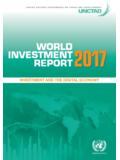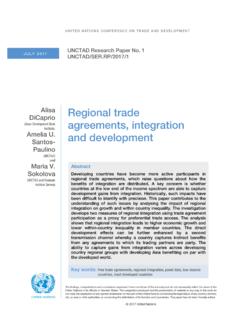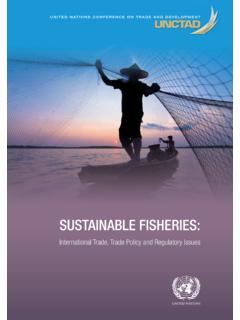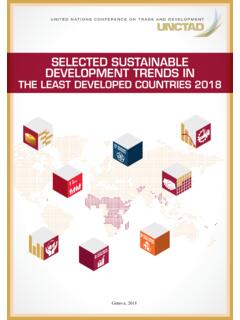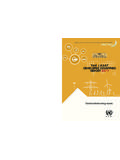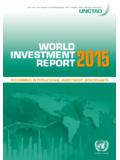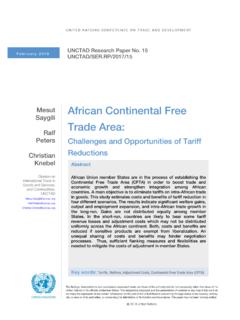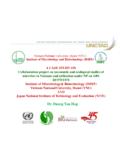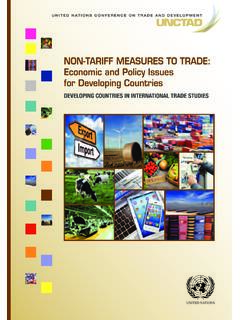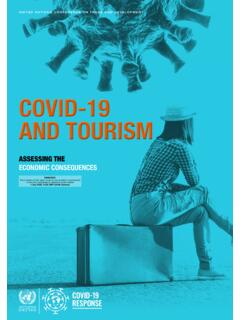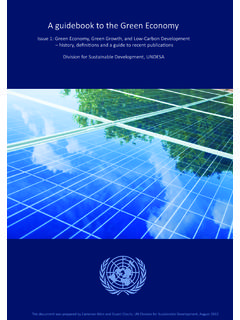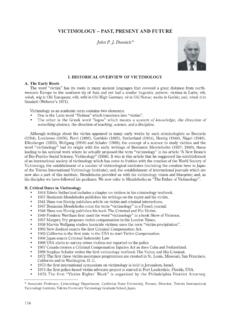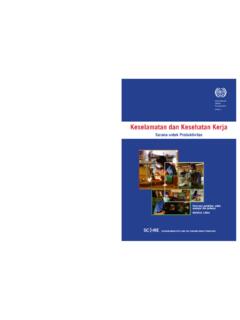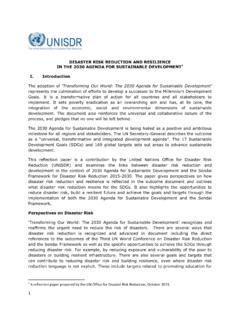Transcription of COVID-19 AND E-COMMERCE - United Nations Conference …
1 IMPACT ON BUSINESSES AND POLICY RESPONSESCOVID-19 AND E-COMMERCE2 COVID-19 AND E-COMMERCE IMPACT ON BUSINESSES AND POLICY RESPONSESTABLE OFCONTENT2020, United Nations Conference on Trade and Development. The findings, interpretations and conclusions expressed herein are those of the authors and do not necessarily reflect the views of the United Nations or its officials or Member States. The designations employed and the presentation of material on any map in this work do not imply the expression of any opinion whatsoever on the part of the United Nations concerning the legal status of any country, territory, city or area or of its authorities, or concerning the delimitation of its frontiers or boundaries.
2 This document has not been formally AND E-COMMERCE IMPACT ON BUSINESSES AND POLICY RESPONSESTABLE OFCONTENTT able of contentsAcknowledgements ..5 Introduction ..6 Key ..9 Profiling respondents ..10 Impact on E-COMMERCE businesses ..13 Overall sales trends ..13 Most used sales channels by E-COMMERCE companies ..14 Variations in the composition of sales ..15 Payment methods ..16 Business outlook: impact on costs and workforce ..17 Challenges, business coping strategies and policy responses ..18 Main challenges encountered ..18 Business facilitation measures: an overview ..20E- commerce business facilitation measures: examples from the public sector ..22 Country highlights by policy area ..24 Public-private cooperation and private sector initiatives.
3 29 Financing ..31 Way forward ..32 Measures to support COVID-19 recovery plans through E-COMMERCE development ..32 Conclusions: UNCTAD support and eTrade for all partnership ..344 COVID-19 AND E-COMMERCE IMPACT ON BUSINESSES AND POLICY RESPONSESTABLE OFCONTENTList of FiguresFigure 1 Impact of COVID-19 crisis on monthly E-COMMERCE sales (in per cent)..7 Figure 2 Top 10 most important measures taken during the COVID-19 crisis (in per cent)..8 Figure 3 Number of respondents per survey section ..10 Figure 4 Number of respondents per country of E-COMMERCE operation ..11 Figure 5 Type of online business (in per cent) ..12 Figure 6 Size of workforce (in per cent) ..12 Figure 7 Impact of COVID-19 crisis on monthly E-COMMERCE sales (in per cent).
4 13 Figure 8 Third-party marketplaces: changes in buyers and sellers since the outbreak of the COVID-19 crisis (in per cent) ..14 Figure 9 Main sales channels, before outbreak of COVID-19 and channels with highest recent growth (in per cent) ..14 Figure 10 Types of goods and services sold online by E-COMMERCE companies before the COVID-19 outbreak (in per cent) ..15 Figure 11 Third-party marketplaces: top 5 sales categories before and after the COVID-19 crisis (in per cent) ..16 Figure 12 Payment methods with highest growth since outbreak of the COVID-19 crisis (in per cent) ..17 Figure 13 Changes in costs and workforce size since the outbreak of the COVID-19 crisis (in per cent) ..17 Figure 14 Top 5 challenges during COVID-19 (in per cent).
5 18 Figure 15 Challenges since the COVID-19 outbreak in eTrade for all Policy Areas (in per cent) ..19 Figure 16 Most important measures taken during the COVID-19 crisis (in per cent) ..21 Figure 17 Number of governmental/public sector measures taken by country to support E-COMMERCE businesses since the outbreak of the COVID-19 crisis ..22 Figure 18 Number of countries reporting to have taken governmental/public sector measures to support E-COMMERCE businesses since the outbreak of the COVID-19 crisis ..23 Figure 19 Company involvement in new public-private sector initiatives to support E-COMMERCE (in per cent) ..30 Figure 20 Reasons for not participating in new public-private initiatives or in joint private sector collaboration (in per cent).
6 30 Figure 21 Search for financing since the outbreak of the COVID-19 crisis and purpose of funding (in per cent) ..31 Figure 22 Source of new financing (in per cent) ..31 Figure 23 Measures that could support COVID-19 recovery (in per cent) ..32 Figure 24 Overview of UNCTAD support through eT Readies ..35 Figure 25 Overview of UNCTAD support in the development of E-COMMERCE strategies ..355 COVID-19 AND E-COMMERCE IMPACT ON BUSINESSES AND POLICY RESPONSESTABLE OFCONTENTA cknowledgementsThis paper was prepared by a team comprising Alessandro Vitale (team lead) and Laura Cyron, in close collaboration with Louis-Pierre Michaud and Vincent Riegel, under the supervision of C cile Barayre and overall guidance of Torbj rn paper is based on a survey that greatly benefited from valuable inputs from a number of survey testers.
7 Priyanka Chetry (Grocerdel, Cambodia), Ibrahima Diagne (GAINDE2000, Senegal), Francis Dufay and Abdesslam Benzitouni (Jumia, Ivory Coast), Melanie Mossard (Impact Hub Phnom Penh, Cambodia), Jumanne Rajabu Mtambalike (Sahara Ventures, Tanzania), Ounteni Ouoba (RigoFaso, Burkina Faso), Maxime Rosburger (Mealtemple, Cambodia), Mahamadi Rouamba (BeeogoLab, Burkina Faso), Mohamed Sow (Jumia, Senegal), and Sam Saili (MauaApp, Samoa). The UNCTAD team wishes to express its profound gratitude to the eT Ready Focal Points and resource persons who responded to the public sector questionnaire and played a proactive role in mobilizing survey respondents in their respective countries as: Mostafizur Rahaman Sohel (BASIS E-COMMERCE Alliance, Bangladesh), Cokou Gagnon (Agence des Services et Syst mes d Information, Benin), Sonam Chedup (Ministry of Economic Affairs, Bhutan), Seydou Ilboudo and Boubakar Bilgo (Ministry of Industry, Trade and Handicrafts, Burkina Faso), Kemvichet Long and Sven Callebaut (Ministry of commerce , Cambodia), Kaladji Fadiga (Ministry of commerce and Industry, C te d Ivoire), Donna Tekanene Reiher and Angoango Fakaua (Ministry of commerce , Industry and Cooperatives, Kiribati), Lattanaphone Voungsohuti (Ministry of Industry and commerce , Lao PR), Phera Lepati (Ministry of Trade and Industry, Lesotho), Gil Razafintsalama (Board of e-trade, Madagascar)
8 , Moriba Camara (General Directorate for Trade, Consumer Affairs and Competition, Mali), Su Thet Hninn (Ministry of commerce , Myanmar), Mahesh Acharya (Joint Secretary, Government of Nepal), Tino Safiatou (Ministry of commerce and Private Sector Promotion, Niger), Jean Premier Bienvenu Rukundo (Ministry of Trade and Industry, Rwanda), Fiona Lene, Roger Toleafoa and Nella Tavita (Ministry of Foreign Affairs and Trade, and Ministry of commerce , Industry and Labour, Samoa), Boubacar Mbodj, Faramkha Diop, Assane Diankha, and Mari me Soda Gueye (Ministry of Trade, Senegal), A ch tou Tour Ali (Ministry of Trade, Industry, Private Sector Development and Local Consumption, Togo), Khabbab Hadhri (Ministry of commerce , Tunisia), Moira Simmons-Avafoa and Darryl Ikbal (Ministry of Fisheries and Trade, Tuvalu), Chris Matsiko (Ministry of Trade, Industry and Cooperatives, Uganda), James Tatangis (Ministry of Tourism, Trade, commerce and Ni-Vanuatu Business, Vanuatu), Nsangwa Ngwira and Gilbert Chisenga (Ministry of commerce , Trade and Industry, Zambia).
9 Valuable comments on a draft version of the paper were received from David Souter and UNCTAD colleagues. Graphic design and desktop publishing were done by Magali Studer. Funding by the Government of Germany is gratefully AND E-COMMERCE IMPACT ON BUSINESSES AND POLICY RESPONSESTABLE OFCONTENTI ntroductionSince the outbreak of the new coronavirus disease ( COVID-19 ) pandemic, UNCTAD has played a critical role in raising awareness on the opportunities emerging from the crisis through increasing the uptake of E-COMMERCE and digital solutions. At the same time, UNCTAD has voiced concerns about the risk of rising digital inequalities, particularly in least developed countries (LDCs).
10 1 The 2020 eCommerce Week organised virtually by UNCTAD and partners of the eTrade for all initiative provided a unique platform convening a wide range of stakeholders to assess implications of the crisis and explore in-depth key digital issues in the context of the COVID-19 As a follow up, UNCTAD assessed the impact on E-COMMERCE businesses across developing countries and LDCs to understand the magnitude of the impact, identify key trends and challenges faced by E-COMMERCE businesses, as well public and private policy responses to cope with the paper is based on the results of a survey that investigates the impact of COVID-19 on E-COMMERCE businesses from early March to end of July 2020.
